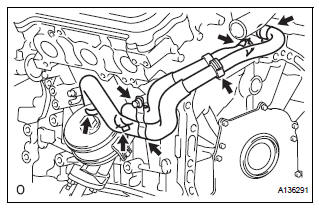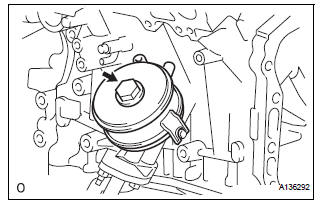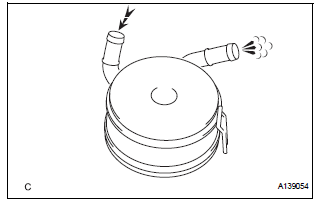Toyota Sienna Service Manual: Removal
1. REMOVE NO. 1 ENGINE UNDER COVER (See page EM-26) 2. REMOVE EXHAUST PIPE ASSEMBLY for 2WD:(See page EX-2) for 4WD:(See page EX-8) 3. DRAIN ENGINE COOLANT (See page CO-6) 4. DRAIN ENGINE OIL (See page LU-4) 5. REMOVE NO. 2 MANIFOLD STAY (See page EM-39) 6. REMOVE NO. 2 EXHAUST MANIFOLD HEAT INSULATOR (See page EM-40) 7. REMOVE EXHAUST MANIFOLD SUB-ASSEMBLY LH (See page EM-40) 8. REMOVE ENGINE OIL COOLER

(a) Remove the bolt, 2 clamps, and 4 clips and disconnect the 2 water by-pass hoses.

(b) Remove the oil cooler union bolt, oil cooler assembly, and O-ring.
INSPECTION
1. INSPECT ENGINE OIL COOLER

(a) Check the engine oil cooler for damage or clogging.
If necessary, replace the oil cooler.
 Engine oil cooler
Engine oil cooler
Components
...
 Installation
Installation
1. INSTALL ENGINE OIL COOLER
(a) Clean the oil cooler contact surface on the cooler
mounting.
(b) Install a new O-ring to the oil cooler.
(c) Install the oil cooler assembly with the uni ...
Other materials:
Reverse Signal Circuit
DESCRIPTION
The radio and navigation assembly receives a reverse signal from the
park/neutral position switch and
information about the GPS antenna, and then adjusts vehicle position.
WIRING DIAGRAM
INSPECTION PROCEDURE
1 INSPECT RADIO AND NAVIGATION ASSEMBLY
Disconnect the radio ...
AUX Port/USB Port
Connect an iPod, USB memory device or portable audio player
to the AUX port/USB port as indicated below. Select ŌĆ£iPodŌĆØ,
ŌĆ£USBŌĆØ or ŌĆ£AUXŌĆØ on the audio source selection screen and the
device can be operated via audio system.
Connecting using the AUX port/USB port
iPod
Open the cove ...
On-vehicle inspection
1. Check battery electrolyte level
(a) Check the electrolyte level.
(1) If the electrolyte level is low, replace the battery
(or add distilled water) and check the charging
system.
2. CHECK BATTERY SPECIFIC GRAVITY
(a) Check the color of the hydrometer.
Result
3. CHECK BATTERY VOLTAGE ...
